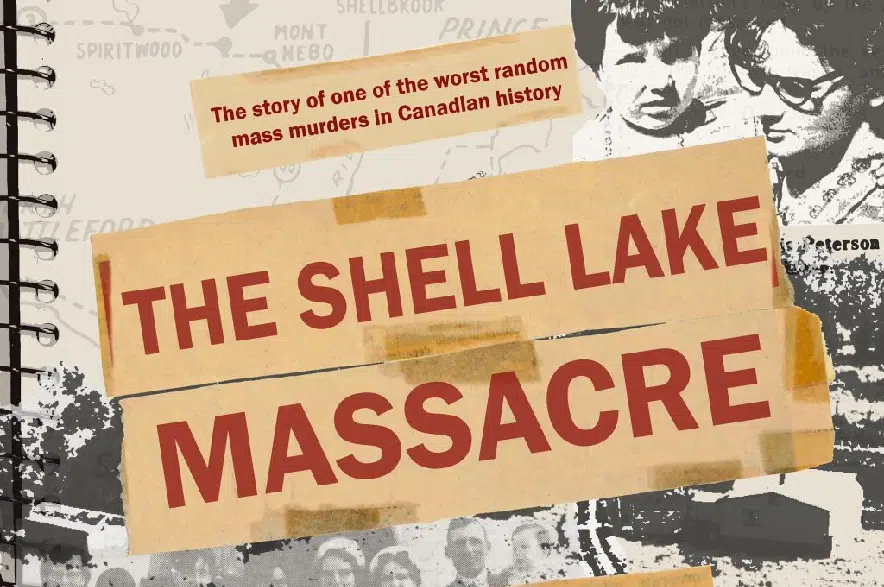On Aug. 15, 1967, James and Evelyn Peterson and seven of their children were murdered in their home near Shell Lake in a shocking crime that still stands as one of the worst random mass murders in Canadian history.
More than 50 years later, a new podcast from Rawlco Radio explores the untold story of the Peterson family and the events surrounding their deaths.
Over six episodes, you’ll get to know the Petersons with the help of Kathy Hill, the only remaining family member, as she shares the most intimate details of their story in this exclusive series.
Listen to Episode 1: The Petersons
Listeners will meet the neighbours who arrived at the Peterson farm to discover the horrific mass murder and learn about the circumstances that led to this unimaginable crime. The podcast covers the RCMP search for the killer and the eventual confession of Victor Hoffman.
Brittany Caffet, producer and host of The Shell Lake Massacre, grew up near Shell Lake and has a personal connection to the tragedy: Kathy Hill is the great-aunt of her spouse.
“I grew up hearing whispers about this crime, and I feel incredibly honoured to have the opportunity to share the real stories of the people who haven’t spoken publicly before,” she says.
“It’s incredible how long-lasting the impact of the murder of the Peterson family has been. Even all these decades later, rumours about the massacre continue to float around this province, and I wanted to get the people closest to this tragedy on the record before it was too late.”
The series airs weekly on 650 CKOM and 980 CJME, with podcast episodes available for download on all major platforms.
Below is a transcript of Episode 1, ‘The Petersons,’ in which listeners learn about the victims of this crime, Jim and Evelyn Peterson and their children, with the help of Kathy Hill.
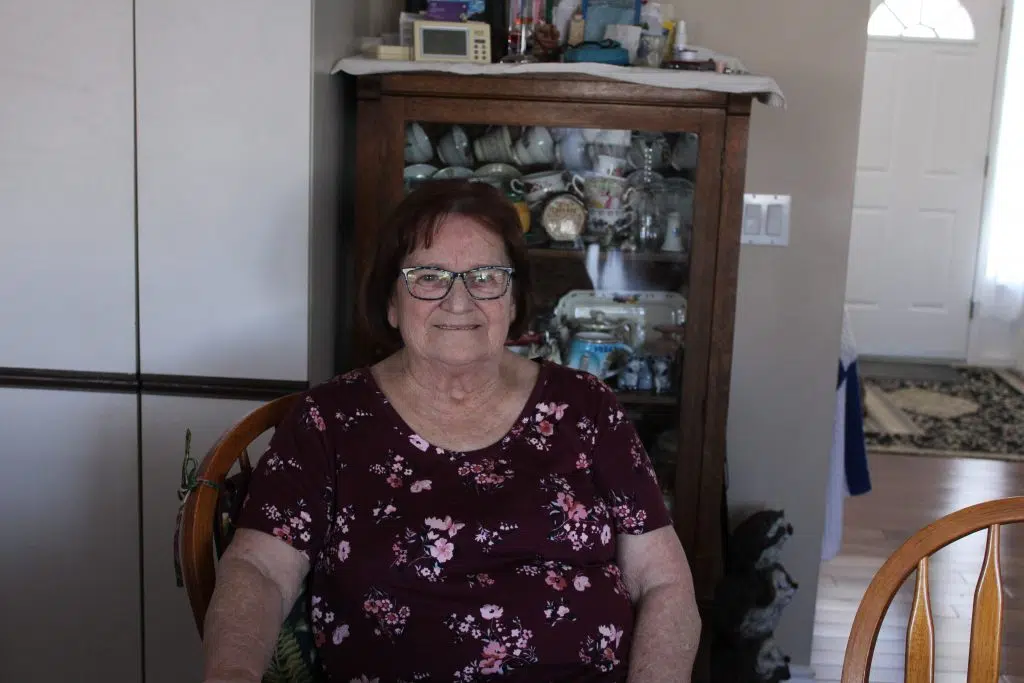
Kathy Hill shares intimate details of her family’s murder with producer and relative Brittany Caffet on April 6, 2023.
Transcript of Episode 1: The Petersons
Disclaimer: Most of the following transcription is AI generated, and errors may have occurred.
There’s a story that I’d like to share with you. It’s mainly a story about loss. Loss of sanity, loss of life, and the loss of a sense of security on the Saskatchewan prairies.
In the early morning hours of Tuesday, Aug. 15, 1967, a complete stranger entered a small white farmhouse near Shell Lake. By the time this stranger left, nine people inside the home were dead.
This is the story of one of the worst random mass murders in Canadian history.
This is the Shell Lake Massacre.
You’re listening to Episode 1 – The Petersons
I’m your host, Brittany Caffet.
I grew up in a small Saskatchewan village called Leoville. Picture a tiny cluster of homes and businesses surrounded by cattle farms and canola fields. There’s one paved road running through the centre of town and a grain elevator casting a shadow over Main Street. A lot of people might describe that town as quiet. Sleepy. Serene, even. But growing up there, it felt anything but.
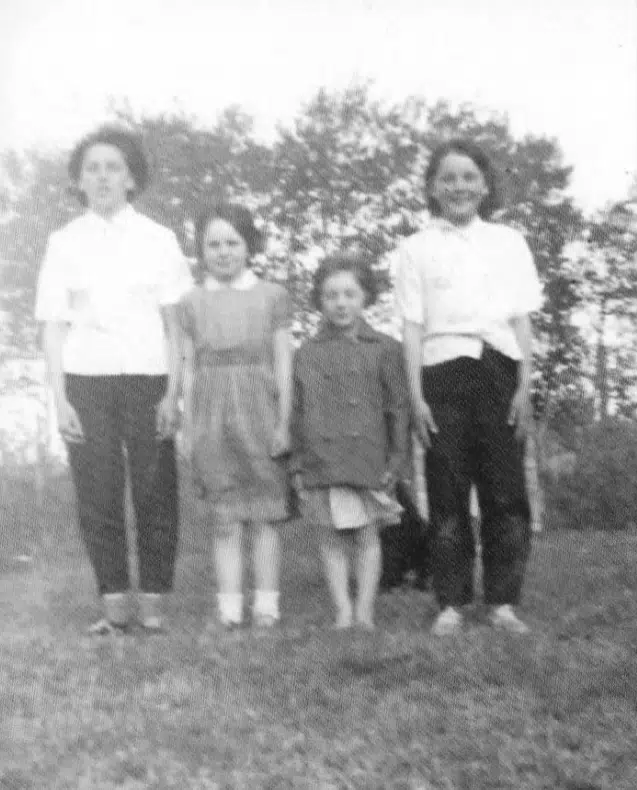
Siblings Jean, Mary, Dorothy and Pearl Peterson died during the massacre on their family farm near Shell Lake in 1967. (Kathy Hill/Submitted)
When you live in a small town, you quickly learn that people are always watching and always talking. It’s hard to keep a secret in a small town on the best of days. And on the worst of days … especially when tragedy strikes … the story spreads like wildfire and it takes a long, long time for that fire to go out.
I grew up hearing whispers of a tragic story that had happened in a nearby community years before I was born — the Shell Lake Massacre. An entire family was slaughtered in their own home in a small farming community just like the one I grew up in. As a child, the story was the stuff of nightmares. Now, as an adult, it somehow seems even worse.
Shell Lake is about a 40-minute drive from my hometown. It’s 140 kilometres north of Saskatoon, the largest city in the province. It’s a really small village — home to just 189 people these days based on the most recent census data. The Village of Shell Lake website describes it as “one of the most picturesque communities in the Parklands” and that really doesn’t feel like an exaggeration. But even with the beautiful scenery, the memory of what happened in that farmhouse in 1967 seems to linger over the community.
While almost everyone in the area has heard about this crime, not many people REALLY know what happened inside the home of Jim and Evelyn Peterson on that fateful morning and to the community in the days that followed.
But I know someone who knows this story inside and out.
Kathleen Hill is my great aunt. She is also the last surviving member of the Peterson family.
While so many remember the Petersons simply as victims, Kathy remembers them as her mom and dad, her brothers and sisters. Before I tell you about what happened to the family, I’d love to tell you about the kind of people they were in hopes that you will also remember them for more than just what happened to them.
[KATHY: “My Dad was James Frederick Hodgson Peterson. Called Jim. He was born in the Paddling Lake area of Saskatchewan. And he had two sisters, Elsie and Evie.”]
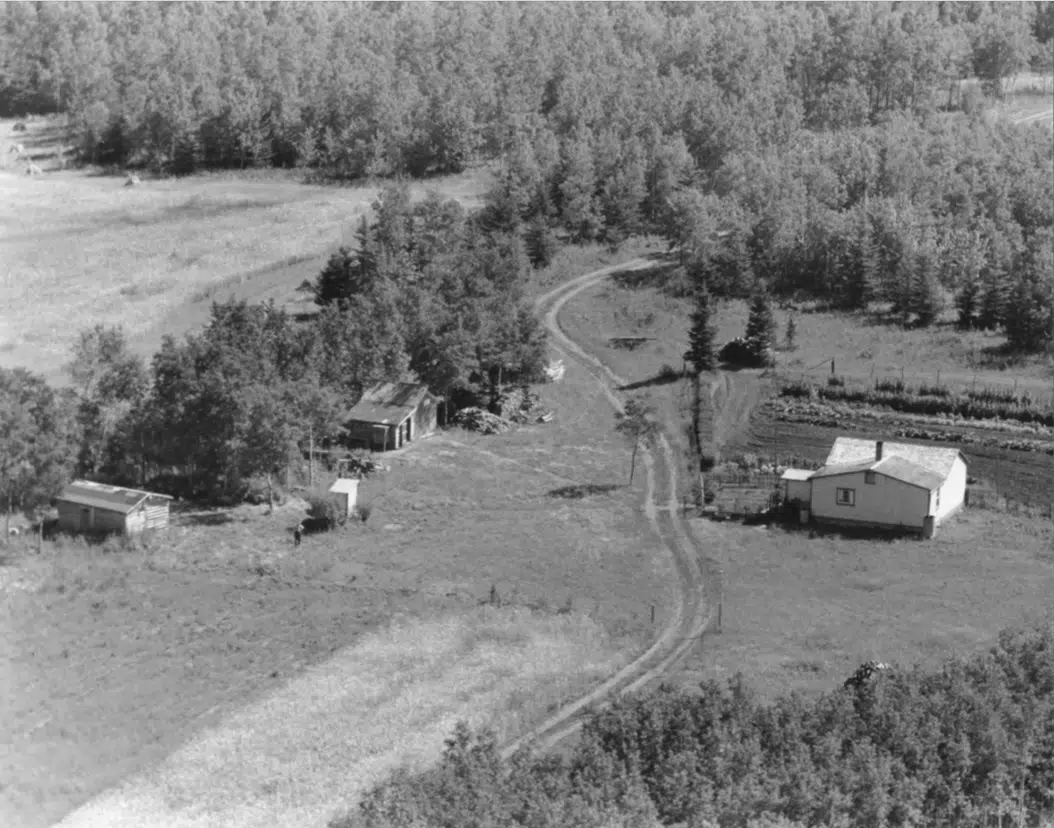
Frederick Peterson, Jim Peterson’s father, purchased the family farm in the 1930s near Shell Lake. Jim and Evelyn Peterson moved their family onto the property in the early 1960s. (Kathy Hill/Submitted)
Based on family photos, Jim and his sisters seemed to have a beautiful childhood growing up on the farm near Shell Lake that their father had purchased in the 1930s. There are photos of the family working in their yard and garden, riding horses, playing instruments, all with big smiles on their faces.
During the Second World War, Jim served overseas. He returned to Saskatchewan in 1945. The Veteran’s Land Act had passed a few years prior in 1942, a government program that provided financial assistance to veterans who were returning from war and hoping to establish themselves on farms and in rural communities. Thanks to this program, Jim was able to purchase a half-section of land near Shell Lake, just half a mile south from the farm where he had spent the majority of his younger years.
Shortly after Jim arrived home and settled back into life away from war, he fell in love with Evelyn.
[KATHY: “My mom was Evelyn May Findlayson. Her parents were Norman and Martha Findlayson. She was born on the 23rd of July, 1925 in Borden, Saskatchewan. She had a sister named Norma and she was exactly 11 months younger than mom. She also had a younger brother named Lorne who is still alive and living in B.C.”]
The family moved to Shell Lake when Evelyn was still a child. She had always been a very quiet girl, and by all accounts that didn’t change much as she got older. Even as a young woman, she was very reserved.
Although they had grown up so close together, Jim and Evelyn hadn’t really got to know each other until he returned from the war. It didn’t take long for their relationship to blossom, and they were married on Sept. 25, 1946 in a small ceremony in Shell Lake.
They started a family shortly after their wedding. Within a year they had welcomed their first child — Kathy. Nine more followed over the next two decades: Jean, Ann (who died in infancy), Mary, Dorothy, Pearl, William, Phyllis, Colin and finally baby Larry who rounded out the Peterson family.
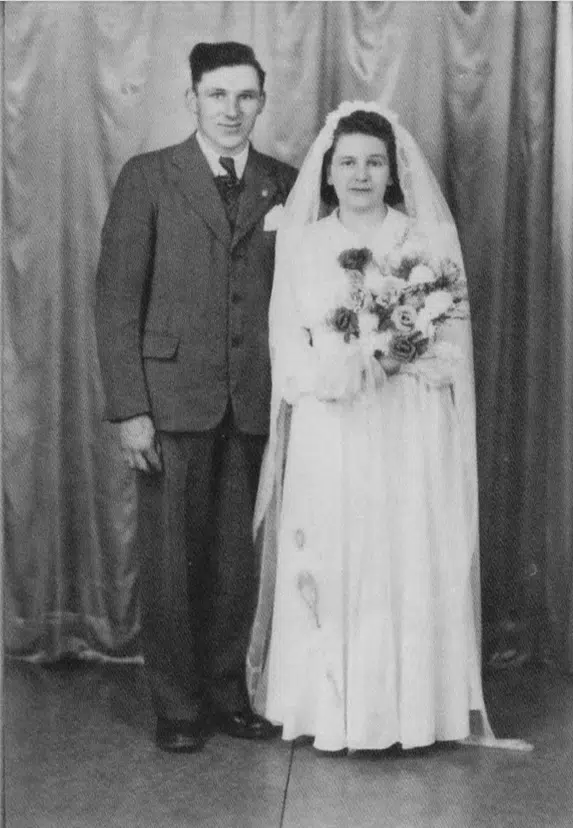
A wedding photo of Jim and Evelyn Peterson. The couple went on to raise nine children on a farm near Shell Lake.
Kathy remembers her dad as a hard-working and reliable man.
[KATHY: “He spent a good … most of his time farming. Sundays, we’d go to church. But the rest of the week he worked. He was very easygoing most of the time, but he did have a short temper, which I think probably reverted back to the war. And I know you never, ever touched him when he was sleeping. You stood back and yelled out to wake him up because he always came up fighting. But he loved everybody, all the kids, got along with everybody pretty much. But if he said he was going to do something, he did it. Very stubborn that way.”]
Her mom was soft-spoken and a very gentle person.
[KATHY: “Well, she was just very quiet, busy, and never really raised her voice to anybody. Never got after us kids for anything, really. She’d leave all that to Dad. She used to get me up in the morning to make breakfast so she could go milk cows because that was her quiet time.”]
And with nine kids at home, that quiet time was treasured by Evelyn. Kathy says growing up in a house full of so many kids was chaotic, but in the very best way.
[KATHY: “Actually it was a lot of fun, really, because you didn’t have to look anywhere for someone to play with. You could have a ball team on your own if you wanted, then we spent a great deal of our time outside or with the cousins. And summer holidays was always spent at one family or another. There was always extra kids there.”]
Sharing memories of her siblings seems bittersweet for Kathy. She has great memories with some, but many of her brothers and sisters were just too young for her to have had the chance to make memories she wishes she had.
[KATHY: “One next to me was Jean. She was a good athlete. And then there was Mary, who did pretty well, good in school. And Dorothy … and Pearl was the next one down. She was fairly quiet. And then there was my brother William and he had a lot of problems. He hadn’t started school yet, but he had been born with a valve missing that drained the fluid from the brain back into the spinal column. And he’d had surgery in the University Hospital, which was only the second surgery ever done. And actually I ended up paying the rest of his hospital bill after he went. And then the other ones well it was Phyllis, and she was actually my baby. I’d looked after her most of the time because there was two others after her yet. And then Colin and then Larry. Larry was just a year old. We were close. Jean and I were especially close. She liked to get out and help outside. She didn’t really want to do anything inside. She was more of an outside person. But she liked doing chores and things like that. Brother William was — my kids remind me of him a lot because he was always looking for trouble and full of the devil (laughs).”]
Kathy was 14 years old when William — Jim and Evelyn’s first son — was born. She recalls how thrilled her dad was to finally have a baby boy in the family after welcoming six precious girls.
[KATHY: “I can still remember, because we had to come to town so he could phone the hospital to find out whether the baby was born or not ’cause he didn’t dare leave everybody home alone. He was in the phone booth and he had left the door open I think. But all I remember hearing was him ‘A BOY!’ and just screaming. The phone lady there she looked at me and started laughing. But yeah, he was very excited.”]
In the early 1960s, Jim’s parents left the homestead that he had grown up on and moved into town. Jim and Evelyn made the decision to move their family from the farm Jim had purchased after returning from the war to his childhood home. The house was small and simple, but comfortable.
[KATHY: “It was only a two-bedroom. There was the kitchen, the living room, then a bedroom off of that and a bedroom off the kitchen. So it was very small, but we had two bedrooms, two beds in the one room and a fold-out couch in the living room that we took turns sleeping on. But usually there was three in a bed. And we hadn’t lived up there all that long. I think maybe about four years, five years. Before that, we were half a mile south in a bigger house, but it was not well-insulated and it was cold, cold in the winter. Whereas the one by the highway, we had a furnace in the basement for heat rather than … just a heater upstairs. So it was a much warmer house, but it was much smaller.”]
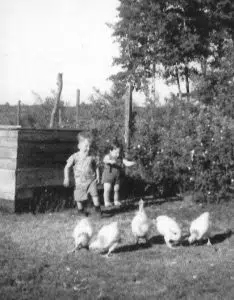
Siblings William and Phyllis Peterson feed chickens on the family farm near Shell Lake. Phyllis was the sole survivor of the massacre on Aug. 15, 1967. (Kathy Hill/Submitted)
A hip-high picket fence surrounded the front yard of the family’s new home and a lilac bush that Kathy still remembers planting thrived next to the path that led you into the house. The Petersons had a mid-sized black and white dog named Skippy who could usually be found near the front yard, greeting familiar visitors with a friendly bark.
Two concrete steps took you up onto a small wooden stoop where a Virginia creeper vine climbed up the fading white paint on the front of the house. Through the front door was a small porch. Steps past the porch was the kitchen and Jim and Evelyn’s bedroom was just beyond that, in direct sight of the front door.
If you looked to your left when you entered the home, you would see the family’s living room complete with a couch, a fold-out cot, a toy rocking horse and a gramophone, a family heirloom that had been passed down from Jim’s mother. Just off the living room was the bedroom where the children slept, containing two double beds and two dressers.
In that small white farmhouse by the highway, life went on for the Peterson family much like it did for most families in the area at the time. Jim stayed busy with the endless list of tasks to be completed around the farm while Evelyn kept house, managed her own farm chores and cared for the children.
They didn’t have a lot of free time, but when they did manage to socialize, they would spend time with neighbours visiting and playing cards. The children attended school in the nearby village of Shell Lake, spent time playing and riding horses with friends, and helped their parents around the house and farm as much as they could. It was a quiet life, but it was a good life.
The Petersons were a well-liked family in the area. They had no enemies and no one seemed to hold any ill will against them … which made what happened in the summer of 1967 all the more shocking.
Some of the last memories that Kathy has with her family are from her wedding. She married Lee Hill on July 7, 1967 in the same church Jim and Evelyn had been married in almost 21 years earlier. She was just 19 at the time.
It was a very small wedding — there wasn’t even enough space to invite all of their many cousins, but Kathy’s entire immediate family was there. Her sister Jean was a bridesmaid and her mom helped her get ready, styling her hair and helping her put the finishing touches on her bridal outfit. Jim proudly walked his daughter down the aisle, and he wanted to make sure he looked good on Kathy’s special day.
[KATHY: “I remember he asked me if he should buy a suit for the wedding. I said ‘No, there’s nothing wrong with the suit you have.’ It was one he had when he was in the army. It was almost 20 years old, but it still fit and looked good on him so I didn’t think he needed to spend any money on a suit for himself.”]
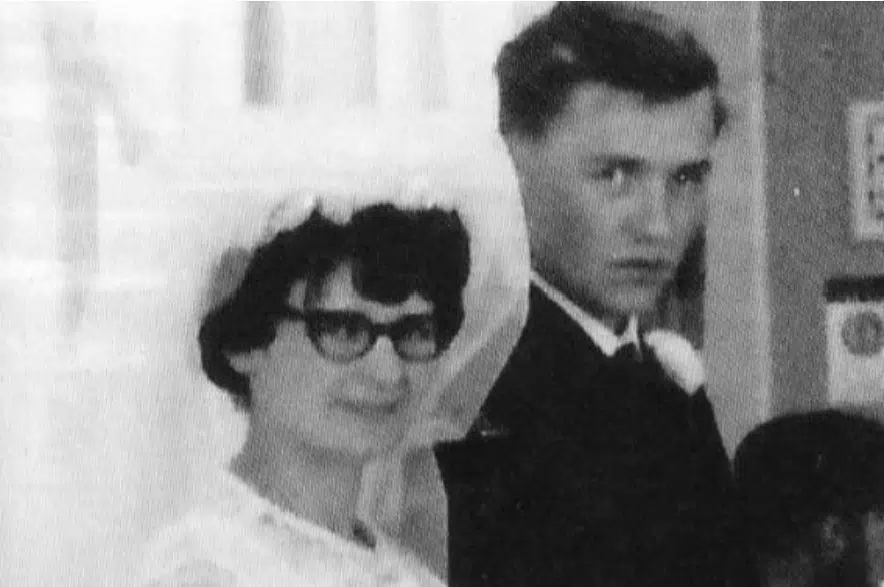
Kathy Peterson, 19, marries Lee Hill on July 15, 1967. She was the only family member not on the farm when the tragedy occurred later that summer. (Kathy Hill/Submitted)
Two days after their wedding, Kathy and Lee packed up their car and got ready to make the long drive to Chetwynd, B.C. Lee had work lined up and the two planned to start their life together as newlyweds.
The Petersons didn’t have a phone, so they knew it would be quite a while before they would have the chance to speak to Kathy again. That was a tough pill to swallow, especially for 17-year-old Jean.
[KATHY: “I still remember when we left the house after everybody said goodbye to everybody and Jean was crying and she said, ‘I’m not going to see you again.’ I said, ‘Oh yeah, you will,’ but it worked out that she didn’t.”]
After a bittersweet goodbye, newlyweds Kathy and Lee got in the car and drove away from the Peterson farm, blissfully unaware of how soon they would be back and how completely different things would be when they returned.
With Kathy away, life on the farm continued for Jim, Evelyn, Jean, Mary, Dorothy, Pearl, William, Phyllis, Colin and Larry. Although they were missing their eldest daughter, Jim and Evelyn were kept busy by the eight children at home. Jean, the most athletic of the bunch, had been invited to attend the Legion Track and Field Camp in Dundurn at the end of August, and Jim was working hard to ensure he had the money to send her.
Wildrew Lang, a close friend and neighbour of the Peterson family, was over on the evening of Aug. 14. He would later recount the events of that evening to Kathy and other neighbours, giving us an inside look into how the last evening for the Petersons played out.
Jim and Wildrew sat visiting while Evelyn worked in the garden and the children meandered about the yard. The men made plans for the next day — they agreed they would clean out feed bins and move about 50 bushels to a nearby grain elevator.
Jim hoped to make about $70 for the grain, and planned to use that money to pay for Jean’s upcoming stay at camp as well as a trip down to Dundurn for the rest of the family to visit her while she was away. Wildrew stayed well into the evening visiting with his longtime friend, but eventually decided it was time to head home and get some rest before the busy day of work that would follow. Jim walked him out to the driveway.
It was a cold, clear night. The moon shone brightly in the sky, illuminating the friends as they stood speculating over whether there would be frost on the ground in the morning and eventually bidding each other farewell. As Wildrew ambled away from the Peterson home toward his own farm, there is no way he possibly could have predicted that by the time he returned the next morning, all but one person in the home he had just left would be dead.
Jim and Evelyn Peterson woke early on the morning of Aug. 15, 1967. Evelyn fed baby Larry as Jim sat on the edge of the bed and began getting ready for the day. The rest of the children were still sleeping — 11-year-old Dorothy was on the fold-out cot in the living room. In the second bedroom, 17-year-old Jean, 13-year-old Mary and four-year-old Phyllis shared one bed while nine-year-old Pearl, five-year-old William and three-year-old Colin shared the other.
An unexpected noise arose on this cool, quiet morning — the whirring of a motor vehicle growing closer and closer to the Peterson home. The crunch of tires turning on the dirt road grew closer and closer until finally it stopped. The vehicle sat for a moment in the driveway of the small white farmhouse. A door opened and closed, and footsteps approached the front door. As Jim Peterson heard this person approaching, he shouted out “Who is it?”
There was no answer.
As the front door of the home that had been a safe haven for Jim for the majority of his life was violently thrust open, he asked again, “Who is it?”
Again, there was no answer.
Jim stood up and asked one final time, “Who is it? Who’s there?”
The intruder was now in sight. He never did respond to Jim’s question. He just raised his weapon … and pulled the trigger.
Credits
The Shell Lake Massacre is a Rawlco Radio production. The show was researched, written, produced and hosted by Brittany Caffet. Supervising producers Sarah Mills and Murray Wood. Story consultant Craig Silliphant. Production support by Dallas Doell. Graphic design by Jennifer Losie. Special thanks to Erin McNutt and John Gormley.
